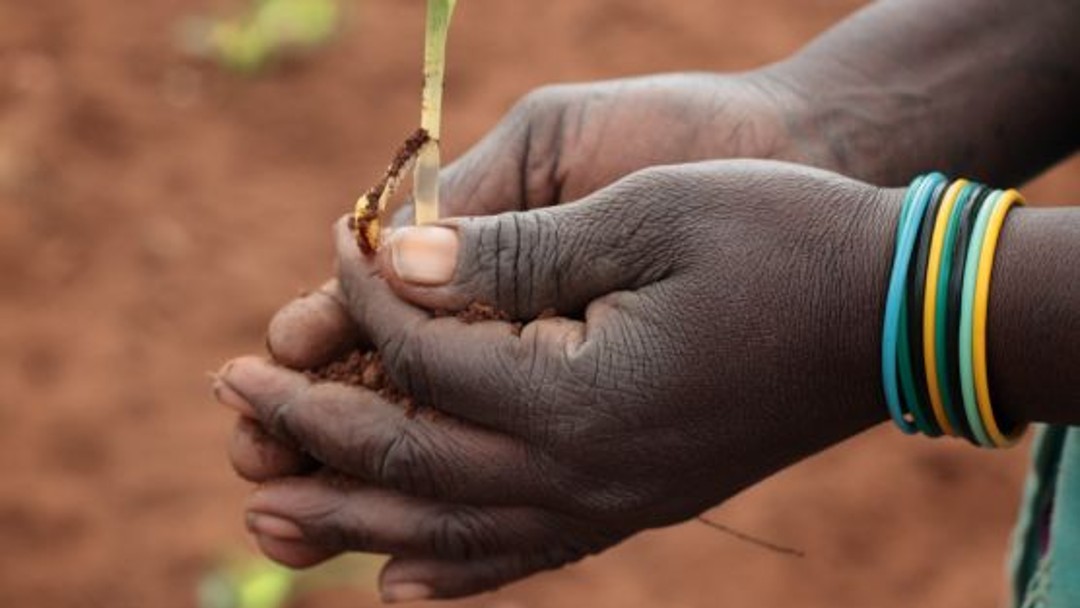News from 2016-05-23 / KfW Development Bank
Frozen treasure
KfW is supporting the international plant seed database on Spitzbergen
The deep cold of Spitzbergen holds a treasure that could one day contribute to the survival of mankind. Seeds are deposited in a high security bunker located 600 kilometres north of the Norwegian mainland, in order to preserve crop diversity. This is not only because a growing number of wild plants dying out. Cultivated plants and agricultural crops are affected too. On May 22, which is proclaimed International Biodiversity Day, the UN will issue a reminder about the threat facing the animal and plant kingdoms.
The largest global collection of crop seeds is kept behind steel doors in an underground vault located at a depth of 120 metres. The vault was opened in 2008 in Svalbard, on the island of Spitzbergen. The island in the North Atlantic provides ideal conditions for storing seeds at minus 18 degrees. Even if the cooling system fails, the permafrost would continue to keep the seeds cool. The region is not affected by earthquakes, volcanic eruptions or floods. Armed conflicts are equally unlikely on the remote island, meaning that the seeds are safely stored there.
Acting on behalf of the German federal government, KfW is contributing EUR 25 million to the capital of the Global Trust Fund for Crop Diversity, the body operating the seed bank on behalf of the Food and Agriculture Organization (FAO), for the purpose of maintaining the seed bank.
The facility on Spitzbergen currently contains seed samples of more than 864,000 plants from all over the world. However, there is room for up to 4.5 million seed samples. One seed sample consists of 500 seeds. The stored seeds are replaced with fresh ones every few years to maintain their germination capacity.
Reassurance for national gene banks
The storage facility in the Far North acts as a backup insurance for the 1,500 gene banks around the world that send a selection of their national seed collections to the Global Seed Vault every year. The "International Center for Agricultural Research in the Dry Areas" (ICARDA) in Aleppo, Syria, recently availed of the possibility of requesting the return of lost seeds. Armed groups took control of the Center and its scientists had to flee to Beirut, where they now operate. They succeeded in taking some seed samples with them, but in 2015 they requested assistance from Spitzbergen to continue supplying their partners around the world with seeds.
Crop diversity is essential for several reasons: agricultural yields must increase to feed the earth's growing population. Even today, climate change requires crops to adapt to conditions such as drought. A broad range of genes ensures that plant types that are also capable of providing high yields under changed environmental conditions can be cultivated. If, for example, wheat no longer thrives because of increasing annual temperatures, cross-cultivation of the Ethiopian grain teff, which is accustomed to extreme dryness, could result in a wheat variety that can continue to deliver high yields.
Although roughly 30,000 of the approximately 350,000 known plant species around the world are edible, modern agriculture, however, only uses 30 species. Furthermore, up to three quarters of the traditionally used crops have been lost in the past 100 years, mostly due to cultivation or neglect. This is because only a few varieties meet the requirements of the modern food production industry, whereby they can be stored over long periods, transported without spoiling and easily processed. The support of the Global Seed Vault contributes to food security, biodiversity and sustainable agriculture.
The preservation of biodiversity will be an important issue on the international agenda in 2016, as the 13th Conference of the Parties to the Convention on Biological Diversity (CBD COP 13) will be held in Cancún/Mexico in December, at which the German Federal Government will also be participating.


Share page
To share the content of this page with your network, click on one of the icons below.
Note on data protection: When you share content, your personal data is transferred to the selected network.
Data protection
Alternatively, you can also copy the short link: https://www.kfw-entwicklungsbank.de/s/enzBWrMC.BW_A
Copy link Link copied